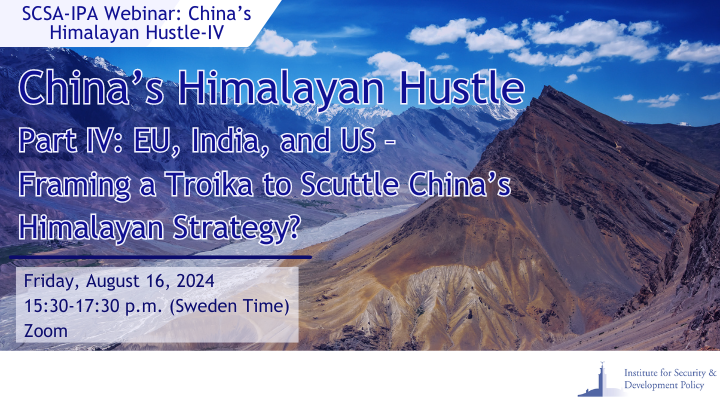China’s Himalayan Hustle – Part IV: EU, India, and US – Framing a Troika to Scuttle China’s Himalayan Strategy?

Did you miss this webinar? The full recording is available on ISDP’s YouTube channel.
China’s adventurism and expansionism in the Himalayan region have not received enough widespread attention globally, especially when compared to the growing visibility of China’s violations in the Indo-Pacific maritime regions, such as the Taiwan Strait or the South China Sea. Often, China’s Himalayan incursions and infrastructure-building tactics are seen through the lens of the unresolved, longstanding India-China border dispute. While the hostilities along the border form an important aspect of the Himalayan geopolitical troubles, China’s revisionism does not begin or end at the border with India. The smaller Himalayan states including Bhutan, Nepal, and Pakistan form an integral part of China’s Himalayan strategy, which has resulted in changing land geographies, economic coercion, and massive ecological degradation.
China’s large-scale infrastructure build-up via rampant and unbridled expansion of military bases, roads, helipads, hydro-power projects, and “dual-use” village settlements in the wider Himalayan region is not only endangering the fragile ecological landscape but also creating conditions for unsustainable geopolitical crises. Its controversial Belt and Road Initiative (BRI) projects such as the Chinese-Pakistan Economic Corridor (CPEC) and the Trans-Himalayan Connectivity Network (THCM) also have immense geopolitical ramifications. China’s military modernization in the Tibetan Plateau, as well as the Chinese party-state’s intent to homogenize multi-ethnic populations and cultures of the Himalayas, add further layers to the dangers of growing Chinese hegemony.
In this context, India’s growing ties with the US, especially the new enhanced defense and technological cooperation, are of immense value. India’s growing resonance – India is no longer the weakest link, as emphasized in the earlier years – in the US-led Quadrilateral Security Dialogue (Quad comprising Australia, India, Japan, and the US) has rattled China the most. The India-US bilateral military exercises like the “Yudh Abhyas” (loosely, training for war), whose 2022 edition was held near the India-China border and partly led to the Tawang skirmish, or Vajra Prahar (literally, weapon strike), held in the north-east of India in 2023, have also conveyed the joint intention to China. For the US, China is a viable threat – officially, the “only country” with both intent and power to re-shape the liberal international order. For that purpose, the US is actively looking to engage with partners and allies to curb China’s coercive policies and tactics aimed at changing the status quo. However, the US’s China strategy still focuses on the Taiwan Strait and the Korean Peninsula. The Himalayan concerns also need to be spotlighted globally, particularly both in the US Congress and the European Parliament.
Similarly, India has seen an uptick in its ties with Europe, with establishment of the EU-India Trade and Technology Council (TTC) and engagement with the EU’s Global Gateway infrastructure project – seen as an alternative to the BRI – in its north-eastern region and neighboring states. It is just as well that the EU also has a “strong presence” in the Himalayan kingdom of Bhutan; and it also provides developmental assistance to both Bhutan and Nepal. Moreover, Europe’s disenchantment with China – the European Union (EU)’s Strategic Compass labels it a “systemic rival” and the North Atlantic Treaty Organization (NATO) calls China a “systemic challenge” – and the EU’s embrace of the Indo-Pacific construct via its 2021 strategy for cooperation have opened the doors for India to enhance engagement with the EU and its members on the varied China-induced Himalayan concerns.
The webinar aims to visualize the possibilities and potential for the EU, India, and the US to work together in order to highlight China’s revisionist actions in the Himalayan region, beyond the India-China border scuffles or the potential for limited war. For such a purpose, it looks into the following questions:
- What are the ways through which the Chinese activities in the Himalayan states could be highlighted in the European Parliament and the US Congress?
- What is the extent, scope, and impact of the massive military modernization in the Tibetan Plateau for the region?
- In what ways can NATO be engaged to counter China’s military muscle in the Tibetan Plateau, without aggravating the regional balance? Should there be a cooperative dialogue between India and NATO on the same?
- What are the chances of the EU acknowledging/recognizing China’s Himalayan hustle as part of its Indo-Pacific strategy? What is the level of awareness in the European Parliament about China’s Himalayan revisionism?
- What tactics can India, the EU, and the US together employ to undo China’s clout in the Himalayas?
- How can the US and the EU contribute to checking Chinese infrastructure activities and taking action against their negative environmental impact on the region?
- Can the US and European policymakers bolster India’s efforts to maintain its geopolitical influence and to fight against China’s disruptive tactics in the Himalayas for the greater good of Indo-Pacific politics?
Panelists:
 Dr. Malcolm Davis joined the Australian Strategic Policy Institute (ASPI) as a Senior Analyst in Defence Strategy and Capability in January 2016. He has worked with the Department of Defence, both in Navy Headquarters in the Strategy and Force Structure area, and with Strategic Policy Division in the Strategic Policy Guidance and Strategic External Relations and Education sections from November 2007 to March 2012. Prior to this appointment, he was a Lecturer in Defence Studies with King’s College London at the Joint Services Command and Staff College, in Shrivenham, UK, from June 2000 to October 2007. He holds a PhD in Strategic Studies from the University of Hull as well as two master’s degrees in strategic studies, including from the Australian National University’s Strategic and Defence Studies Centre. His main research focus is on defense strategy and capability development, military technology, and the future of warfare.
Dr. Malcolm Davis joined the Australian Strategic Policy Institute (ASPI) as a Senior Analyst in Defence Strategy and Capability in January 2016. He has worked with the Department of Defence, both in Navy Headquarters in the Strategy and Force Structure area, and with Strategic Policy Division in the Strategic Policy Guidance and Strategic External Relations and Education sections from November 2007 to March 2012. Prior to this appointment, he was a Lecturer in Defence Studies with King’s College London at the Joint Services Command and Staff College, in Shrivenham, UK, from June 2000 to October 2007. He holds a PhD in Strategic Studies from the University of Hull as well as two master’s degrees in strategic studies, including from the Australian National University’s Strategic and Defence Studies Centre. His main research focus is on defense strategy and capability development, military technology, and the future of warfare.
 Dr. Ernest Gunasekara-Rockwell is the editor-in-chief of the Journal of Indo-Pacific Affairs. He previously served as acting director and managing editor of Air University Press and acting dean of the Air Force Research Institute. A former human intelligence collector and Korean linguist for the US Army, Dr. Gunasekara-Rockwell has also taught at various institutions, including the DOD’s Defense Language Institute Foreign Language Center. His work focuses on geopolitical and security issues in the Indo-Pacific region, making significant contributions to the field through his leadership and scholarly publications. He holds a PhD from the University of Wisconsin–Madison.
Dr. Ernest Gunasekara-Rockwell is the editor-in-chief of the Journal of Indo-Pacific Affairs. He previously served as acting director and managing editor of Air University Press and acting dean of the Air Force Research Institute. A former human intelligence collector and Korean linguist for the US Army, Dr. Gunasekara-Rockwell has also taught at various institutions, including the DOD’s Defense Language Institute Foreign Language Center. His work focuses on geopolitical and security issues in the Indo-Pacific region, making significant contributions to the field through his leadership and scholarly publications. He holds a PhD from the University of Wisconsin–Madison.
 Dr. Medha Bisht is an Associate Professor at the Department of International Relations at South Asian University. Her research interests include philosophy and theory of International Relations, water governance, and diplomacy at international, transboundary, and local scales, transnational networks in International Relations (with a special focus on water, climate, and energy sector), Asian diplomatic thought, and qualitative methods. Her book, ‘Kautilya’s Arthashastra: Philosophy of Strategy’ has been published by Routledge (London and New York 2020). Before joining SAU, she was an Associate Fellow at MP-IDSA, an independent think tank under the Ministry of Defence, and a Research Associate with the Institute for Social Studies Trust, an NGO with special consultative status with ECOSOC UN. She has undertaken consultancies with UNIFEM, ICIMOD, UNDP, IUCN, OXFAM, DFID/Asia Foundation, University of Arizona. Dr Bisht also regularly delivers lectures at Sushma Swaraj Foreign Service Institute, Ministry of External Affairs on transboundary water issues and has participated in Track 2 and 1.5 dialogues on climate change. She is a member of regional and international working groups on transboundary rivers and climate change and has led and co-led international projects on water governance and diplomacy.
Dr. Medha Bisht is an Associate Professor at the Department of International Relations at South Asian University. Her research interests include philosophy and theory of International Relations, water governance, and diplomacy at international, transboundary, and local scales, transnational networks in International Relations (with a special focus on water, climate, and energy sector), Asian diplomatic thought, and qualitative methods. Her book, ‘Kautilya’s Arthashastra: Philosophy of Strategy’ has been published by Routledge (London and New York 2020). Before joining SAU, she was an Associate Fellow at MP-IDSA, an independent think tank under the Ministry of Defence, and a Research Associate with the Institute for Social Studies Trust, an NGO with special consultative status with ECOSOC UN. She has undertaken consultancies with UNIFEM, ICIMOD, UNDP, IUCN, OXFAM, DFID/Asia Foundation, University of Arizona. Dr Bisht also regularly delivers lectures at Sushma Swaraj Foreign Service Institute, Ministry of External Affairs on transboundary water issues and has participated in Track 2 and 1.5 dialogues on climate change. She is a member of regional and international working groups on transboundary rivers and climate change and has led and co-led international projects on water governance and diplomacy.
 Professor Yoichiro Sato holds a Ph.D (Political Science) from the University of Hawaii and currently teaches at Ritsumeikan Asia Pacific University. He was a visiting senior research fellow at Yusof Ishak Institute of Southeast Asian Studies (ISEAS), 2022-23. His major works include Re-Rising Japan (co-edited with Hidekazu Sakai, Peter Lang, 2017), and Alliances in Asia and Europe (co-edited with Elena Atanassova-Cornelis and Tom Sauer, Routledge, 2023).
Professor Yoichiro Sato holds a Ph.D (Political Science) from the University of Hawaii and currently teaches at Ritsumeikan Asia Pacific University. He was a visiting senior research fellow at Yusof Ishak Institute of Southeast Asian Studies (ISEAS), 2022-23. His major works include Re-Rising Japan (co-edited with Hidekazu Sakai, Peter Lang, 2017), and Alliances in Asia and Europe (co-edited with Elena Atanassova-Cornelis and Tom Sauer, Routledge, 2023).
 Maj Gen Mandip Singh, SM, VSM, is President (Strategic Alliances) at the Droneacharya Aerial Innovations Ltd, a leading public company in the drone space, and an Advisor, at the Technology Business Incubation Foundation at the Indian Institute of Technology (IIT), Ropar, India. The General is a Visiting Fellow at the Mercator Institute of China Studies (MERICS), Berlin, and is a Senior Fellow at the Centre for Land & Warfare Studies (CLAWS) as well as a Distinguished Fellow at the United Services Institute (USI), New Delhi. He retired after 38 yrs of distinguished service in the Indian Army. He was a Senior Fellow at the Institute of Defence Studies & Analyses (IDSA), a leading MoD think tank where he headed the China & East Asia Centre in 2011-12. Later he headed the China desk in the Army Training Command. He was the Dean at the Army’s premier institution, the Army War College where he contributed to the thinking on operational art & strategic thinking.
Maj Gen Mandip Singh, SM, VSM, is President (Strategic Alliances) at the Droneacharya Aerial Innovations Ltd, a leading public company in the drone space, and an Advisor, at the Technology Business Incubation Foundation at the Indian Institute of Technology (IIT), Ropar, India. The General is a Visiting Fellow at the Mercator Institute of China Studies (MERICS), Berlin, and is a Senior Fellow at the Centre for Land & Warfare Studies (CLAWS) as well as a Distinguished Fellow at the United Services Institute (USI), New Delhi. He retired after 38 yrs of distinguished service in the Indian Army. He was a Senior Fellow at the Institute of Defence Studies & Analyses (IDSA), a leading MoD think tank where he headed the China & East Asia Centre in 2011-12. Later he headed the China desk in the Army Training Command. He was the Dean at the Army’s premier institution, the Army War College where he contributed to the thinking on operational art & strategic thinking.
Moderator:
 Dr. Jagannath Panda is the Head of the Stockholm Center for South Asian and Indo-Pacific Affairs at the Institute for Security and Development Policy, Sweden. He is a Professor at the Department of Regional and Global Studies at the University of Warsaw, and a Senior Fellow at The Hague Center for Strategic Studies (HCSS) in the Netherlands and an International Research Fellow at the Canon Institute for Global Studies in Japan. Dr. Panda has testified to the US-China Economic and Security Review Commission at the US Congress. He is also the Series Editor for Routledge Studies on Think Asia.
Dr. Jagannath Panda is the Head of the Stockholm Center for South Asian and Indo-Pacific Affairs at the Institute for Security and Development Policy, Sweden. He is a Professor at the Department of Regional and Global Studies at the University of Warsaw, and a Senior Fellow at The Hague Center for Strategic Studies (HCSS) in the Netherlands and an International Research Fellow at the Canon Institute for Global Studies in Japan. Dr. Panda has testified to the US-China Economic and Security Review Commission at the US Congress. He is also the Series Editor for Routledge Studies on Think Asia.
The third webinar of the series will take place on August 15, 2024, find more information and register here:
Did you miss the first two webinars in this series? Here, you can find the details and links to the recordings: